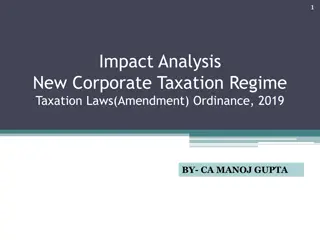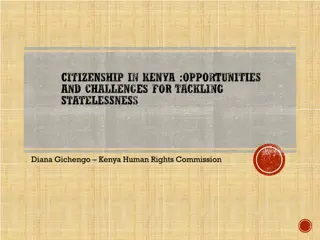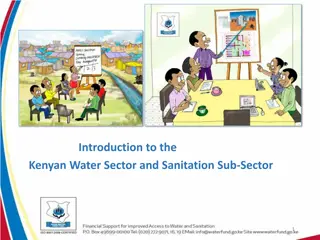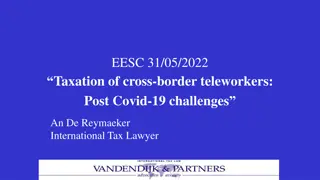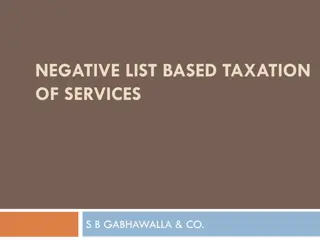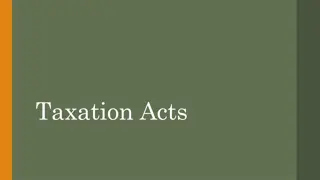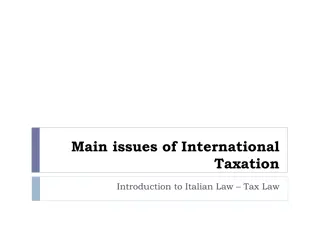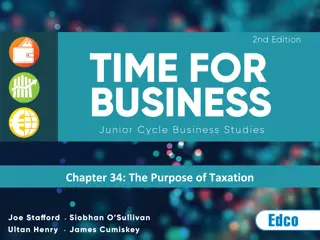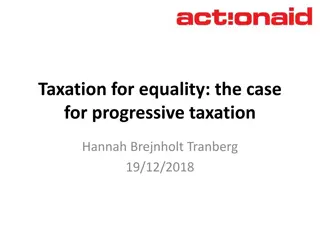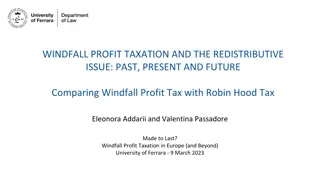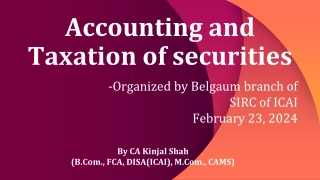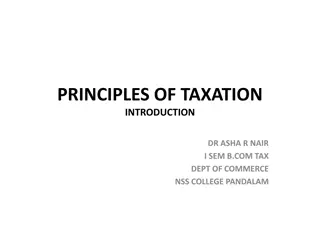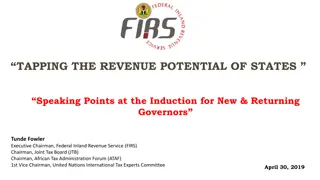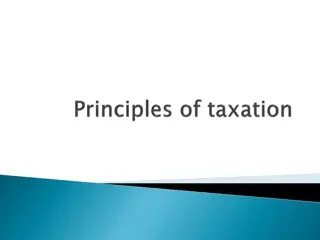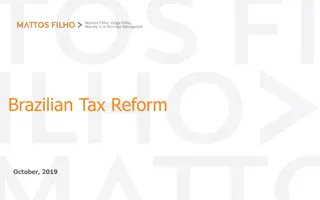Challenges of Kenyan Taxation System and Solutions
The Kenyan taxation system faces complexities in terms of the ITax system, low taxpayer acceptance, capacity issues at the Kenya Revenue Authority (KRA), and lack of political will. Simplifying the filing process, increasing taxpayer education on the importance of taxes, enhancing KRA capacity, and gaining political support can address these challenges.
Download Presentation

Please find below an Image/Link to download the presentation.
The content on the website is provided AS IS for your information and personal use only. It may not be sold, licensed, or shared on other websites without obtaining consent from the author. Download presentation by click this link. If you encounter any issues during the download, it is possible that the publisher has removed the file from their server.
E N D
Presentation Transcript
Using Taxation to Reduce Poverty and Dependence Yussuf A. Idarus
Definition of Taxation Oxford dictionary: Contribution levied on persons, property, or business for the support of government. Main Types of Taxes Income Taxes- Corporate tax, PAYE, Rental Income Value Added Tax VAT Withholding Taxes- on Professional and Contractual Services, on Interest Excise Duty- On Imported Goods and Services, on Luxurious Items, on Commissions on Money Transfer Services Custom Duty on Imported Goods Railway Development Levy Stamp Duty -on Purchase of Land, on Some Category of Bank Transactions, on Registration of Documents at the Lands Registry Roads Development Levy Land Rates and Rent
Challenges of the Kenyan Taxation System Complexity: The Kenyan tax system is overly complex and requires specific training. The following are the main issues The itax system of filing returns: This is an automated online system which tax payers have to use for filing returns. It was introduced with little testing and the forms are not user friendly The system at times hangs and does not explain how to resolve issues the tax payer is facing There are very many forms to be filled in some of which add no value i. ii. iii. There is thus a need to simplify the system for filling these returns
Challenges (contd) Acceptance: A very small percentage of Kenyans pay taxes willingly. This could be as a result of Most of us do not know the importance of paying taxes For those who know, they are not willing to pay taxes because they doubt the avenues with which the tax revenues are put into-Corruption? Some tax payers consider paying the correct taxes unfair and some large potential tax payers are simply not paying any taxes Part of our culture - most of us avoid paying taxes as part of our don t care attitude i. ii. iii. iv.
Challenges (contd) Lack of Capacity at KRA: From the research paper presented it is obvious that KRA lacks capacity to handle taxes. The distribution of the little Human Resources that they have makes the issue even worse Political Will: The KRA has not been receiving the necessary political support from the Government. A case in point is the duration it took to implement the Capital Gains Tax and several other taxes which do not favour the politicians. Many potential tax payers are not paying taxes because they have not been captured in the tax net
Using Taxation to Reduce Poverty and dependence Taxation contributes a significant amount of resources and cashflow about 18.1% of the GDP (oe.cd/revenue-statistics-in-Africa) Overall Revenue for the first half (H1) of FY 2017/18 was Sh 712.2 billion (KRA) The government has to borrow either internally or from external parties in order to finance its deficit. This means resources which should be used for development are used to pay interest. If well implemented taxation can contribute significantly in financing this deficit. The following are recommendation for using taxes to reduce poverty and dependence
Improve Resource Allocation for KRA Restructure KRA with a view to allocating resources where needed most for example; Deploying staff from less sensitive areas like research to audits and investigations department Allocate/recruit more staff to work in the fields and areas where tax is either evaded or avoided e.g where there is significant development of rental properties and in the informal sector Enact laws will permit the KRA to appoint agents to collect taxes on its behalf. E.g MPESA agents in the case of Safaricom i. ii. iii.
Recommendations(contd) Simplify Tax compliance- devise other ways for people to comply with the taxes other than by filing electronic returns e.g manual returns Educate the general public about taxes: the KRA should work in conjunction with the Ministry of Education to include taxation in the primary school syllabus. Demonstrate the benefits of taxes though media campaigns Widen the tax net by introducing new taxes for the informal Jua Kali sector Eradicate Corruption- Serious punitive measures should be taken against people involved in corruption within the government The EACC should be empowered through training to pursue corruption cases more aggressively
Other Recommendations Imposition of higher tariffs on imported goods and services which can be produced locally hence increase employment opportunities Introduction of the Rich Man Taxes through widening of the tax brackets where those earning more are taxed more Grant exemptions to companies and other organisations that are willing to assist in poverty eradication through Foundations and other forms of charitable institutions
Other Forms of Taxes Religious Obligations: Many religions have obligations to be paid as a form of taxes. Some of these are: For the Christians-Tithing is the practice established by God in the Old Testament, of contributing one-tenth of one's income to support the works of the Church and charity to others. For the Muslims- Zakat is the compulsory giving of a set proportion of one's wealth to charity. It is regarded as a type of worship and of self-purification. Zakat is the third Pillar of Islam For Hindus-D na connotes the virtue of generosity, charity or giving of alms in Indian philosophies. ... In Hinduism, Buddhism, Jainism and Sikhism, d na is the practice of cultivating generosity. It can take the form of giving to an individual in distress or need. i. ii. iii.
Uses of these Taxes Funds collected by religious organisations have been used to build schools, hospitals, water points which supplement the Government s efforts to provide basic services to it s citizens. Payment of school fees to the needy and aid to the poor Religious organisations should be encouraged to preach more on the benefits of donation by its followers The mainstream religious organisations like the Catholic churches, PCEA, the SUPKEM, Hindu and Sikh Union should work together to come up with proposals that can help the citizens, this will also encourage interfaith dialogue
Any Comments/??????? Thank You
Principles of a Good Tax System: Productivity or Fiscal Adequacy: Should yield enough resources to enable the Government finance development and welfare activities i. Elasticity of the Tax System: As national income increases as a result of economic growth, the Government revenue from taxes should also increase. ii. Diversity: There should be many types of taxes to avoid reliance on the popular taxes iii. Taxation as in Instrument of Economic Growth: The tax system shall be such as shall enable the Government to mobilise adequate resources for capital formation or economic growth. iv. Taxation as an Instrument for Improving Income Distribution: The purpose of a good tax system for a developing economy is not merely to raise revenue for the Government but also to ensure that burden of taxes falls more on the rich. v. Taxation for Ensuring Economic Stability: The taxation system must be progressive in relation in the changes in national income. This will ensure that when national income rises, an increasing part of the rise in income should automatically accrue to the Government and vice versa in the case of depression vi.


